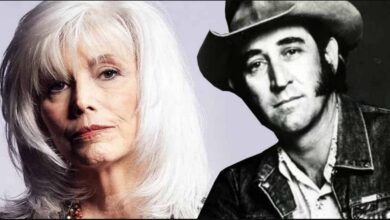Numerous artists have covered this, but Elvis truly stands above the rest
Elvis Presley’s rendition of “Funny How Time Slips Away,” recorded in 1972, exemplifies not just his vocal prowess but also his innate ability to connect emotionally with his audience. The song, originally penned by Willie Nelson, speaks to the themes of nostalgia and the bittersweet nature of time and relationships. The poignant lyrics resonate deeply with listeners, and Elvis brings a unique interpretive quality that enhances the heartfelt message of the song. His smooth, emotive vocal delivery brings a warmth and sincerity that makes the performance memorable, effectively capturing the essence of loss and longing that permeates the piece.
Elvis, with his rich baritone, employs a heartfelt phrasing that draws the listener in, compelling them to engage with the introspective lyrics. The arrangement of “Funny How Time Slips Away” features a delicate orchestration, allowing Elvis’ vocals to soar while still maintaining the song’s reflective tone. It’s a subtle yet powerful musical backdrop that complements his interpretation, creating an emotional landscape that amplifies the song’s message. This masterful melding of voice and music is a hallmark of Elvis’ work and illustrates his ability to transform songs into profound experiences for his audience.
During the early 1970s, when Elvis recorded this track, he was in a period of musical exploration, blending various genres to create his signature sound. This transitional phase reflected his desire to delve into different styles, including country, soul, and pop, which contrasted with his rock-oriented beginnings in the 1950s. This evolution allowed him to broaden his artistic range, reaching new audiences and reinvigorating his creative output. His interpretation of timeless classics like “Funny How Time Slips Away” highlights his adaptability and willingness to take risks as an artist.
Elvis’s history as a performer is rich and varied, providing context for his musical choices. Born in Tupelo, Mississippi, in 1935, he quickly became a household name by revolutionizing popular music with his unique blend of rockabilly, rhythm and blues, and gospel influences. His early hits, such as “Heartbreak Hotel” and “Hound Dog,” established him as the “King of Rock ‘n’ Roll.” However, it was his ability to cross genres that truly set him apart, allowing him to remain relevant in a rapidly changing music landscape.
Elvis’s career was marked by a series of iconic performances and cultural milestones. His electric stage presence and charismatic persona captivated millions and established him as a symbol of youthful rebellion in the post-war era. The 1960s saw him transition into film, where he starred in numerous movies that showcased not only his singing talents but also his acting abilities. These ventures contributed to a vast legacy that extended far beyond just music, making him a multifaceted entertainer.
In later years, particularly during the 1970s, Elvis returned to his musical roots, embracing the influences of country and blues. His ability to convey deep emotional truths through his music was particularly poignant during this era. The recording of “Funny How Time Slips Away” is a perfect example of this period, as it reflects both personal reflections and universal themes of love and loss. His approach to the song is reflective and melancholic, serving as a reminder of the passage of time and the inevitable changes it brings.
The collaboration with skilled musicians in the studio during this recording further enhanced the emotional depth of the performance. The backing ensemble provided a lush soundscape that filled the room with harmony while allowing Elvis’ voice to take center stage. This collective musicianship underlines his artistic vision, demonstrating his ability to blend various elements into a cohesive musical experience. Such collaboration is a key element in many of his recordings, highlighting the importance of teamwork in creating memorable music.
Elvis’ influence on subsequent generations of musicians remains significant even decades after his passing. Artists from various genres have cited him as a major influence on their work, and his approach to blending different musical styles continues to inspire contemporary creators. “Funny How Time Slips Away” is just one entry in his extensive catalog, yet it stands out as a particularly eloquent example of how he could infuse a song with both personal and collective emotion.
Today, listeners revisit Elvis Presley’s catalog not only for nostalgia but also for a genuine appreciation of his artistry. “Funny How Time Slips Away” remains a staple in the discussions around his best works, showcasing his unmatched ability to convey complex emotions through music. As audiences reflect on their own relationships and the passage of time, this song resonates deeply, serving as a reminder of the universal truths embedded in Elvis’ music.
In conclusion, Elvis Presley’s 1972 rendition of “Funny How Time Slips Away” encapsulates both his vocal brilliance and his profound understanding of music’s emotional power. Through this song, he demonstrates his ability to meld personal resonance with broader themes, bridging the gap between artist and listener. His legacy endures in the hearts of fans and musicians alike, ensuring that his contributions to music will continue to be celebrated and cherished.





